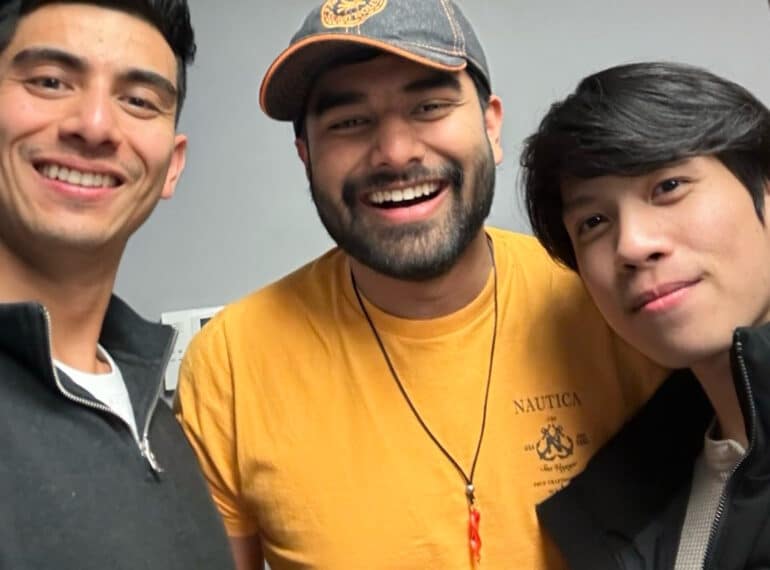
Three Old Elizabethan entrepreneurs in San Francisco have linked up and are now connecting with other alumni working in the world’s leading centre for technology companies.
Pavir Patel sent Headmaster Neil Enright the above photo of himself, Akshat Sharma and Richard Ou together in San Francisco. The three only discovered that they had the same alma mater through chance conversations, but, since then, they have created a group chat and have been expanding it to include more OEs in and around the Bay Area.
Mr Enright said: “Our alumni network has been growing rapidly in recent years, with leavers supporting each other, sharing professional opportunities and socialising together. Especially for alumni far from home, like Richard, Akshat and Pavir, it can be good to spend time with others who share a similar background. As a School, we are doing all we can to support such connections through our QE Connect social and business network.”
Richard (OE 2010–2015) said: “All three of us are founders looking to build billion-dollar companies in Silicon Valley. Quite a few QE boys that I’ve met in the US have been entrepreneurs, too, all having raised not so insignificant amounts of capital. It feels like we’re following in the footsteps of Demis Hassabis and Mustafa Suleyman, maybe a few years or a decade behind.” (Demis [OE 1988–1990] and Mustafa [1995–2002] were among the three co-founders of leading AI company DeepMind, formed in 2010.)
“What I am really excited about is more people from QE coming to the US. I think this is the place to be,” Richard added.
Pavir (OE 2003–2010) and Akshat (2012–2019) are part of the long-established international Entrepreneur First accelerator, which runs one of its four programmes in San Francisco. “However, they’d not met until after Pavir’s encounter with me,” says Richard. “I met Pavir at a FinTech AI hackathon hosted at the Digital Garage office in San Francisco. The conversation went something like this:”
Richard: “Where in the UK are you from?”
Pavir: “London, what about you?”
Richard: “I’m from London as well. Whereabouts?”
Pavir: “Stratford, and you?”
Richard: “Highgate”
Pavir: “I used to go to school up north of Highgate!”
Richard: “Really, where?”
Pavir: “QE Boys”
Richard: “Holy sh*t, I went to QE as well!”
Richard later met Akshat at the Entrepreneur First office.
As for Pavir and Akshat, they knew each other through being in the same accelerator, but did not realise the full extent of their connection until a conversation in a Waymo (self-driving car) turned to their backgrounds. “It was surreal,” said Akshat. “We were mates already and were speaking about our homes in the UK and school experiences…and there was a moment of realisation of ‘Wait a second – that sounds very familiar’ when we realised we both went to QE!”
 Richard said he realised even before going to university where he needed to be to pursue his goal of founding and growing a startup. “I knew that if I wanted to do it, the only place I could was the US. The problem was that education in the US was so expensive – four years of a degree course can easily be $250,000.”
Richard said he realised even before going to university where he needed to be to pursue his goal of founding and growing a startup. “I knew that if I wanted to do it, the only place I could was the US. The problem was that education in the US was so expensive – four years of a degree course can easily be $250,000.”
The solution he arrived at was to go to King’s College London, majoring in Physics (“my passion”) for his first degree and then come to the US for a Master’s degree at the University of Pennsylvania – “only two years!” He worked out some further ways to reduce the financial burden, including becoming a Resident Advisor (RA) – a peer mentor for other students – which comes with the major plus that free housing and food are provided.
The idea for his business came about when he graduated from ‘Penn.’ last year and was looking for a graduation photographer. “I realised it was really hard – there is not really any infrastructure for freelancing.”
With time on his hands, he worked out a plan for a business to put that right, checking that he had a Minimum Viable Business (MVB). He shared the plan with the photographer he had eventually found, Jerry Cai. “As soon as I pitched it to him, he said: ‘I want in.’”
The two became co-founders of Agorum, described on its website as “a freelancer marketplace connecting clients with skilled creatives”. They have started initially by focusing on freelancers who require a physical presence for their work – photographers, DJs and private chefs.
The process has not always been easy. “Funding was difficult at first. We tried raising funds last year when the economy was not doing very well.”
Since then, however, they have been scaling rapidly, and Richard is focused on taking the business global. Agorum was recently valued at $10m.
“I think what changed things was moving to the Bay area: I don’t think there is an eco-system like the Bay’s that exists anywhere else in the world.”
He acknowledged the help provided by his accelerator – VIP-X (different from Pavir’s and Akshat’s). VIP-X is run by the University of Pennsylvania’s Wharton business school and caters primarily for people associated with Penn. and Wharton. It takes no equity and offers what are essentially grants, not loans.
“I think one of the hardest parts of doing a startup is the loneliness and distance that comes with it,” said Richard. “Few people can relate.” In particular, he has found the constant need for absolute discretion about his plans for the business hard. “As the CEO, there is only so much you can ever say.”
“As my role has changed from managing a team of 1.5 people to now a team of ten, the problems are constantly evolving.”
“The thing is persistence,” Richard said, stressing the importance of listening to clients, who sometimes provide the only clue as to a way forward. “There is something about this gut instinct – and it usually comes from your customer. It becomes your driving force.”
Richard has no doubt as to the source of his strength. “When I look back at my time at QE, it was hard. A lot of homework and pressure. Retrospectively, that is what helped, giving me the resilience I am drawing on now. A lot of people have shared that with me, too. Things were always hard, but that raised your tolerance for a lot of things.”
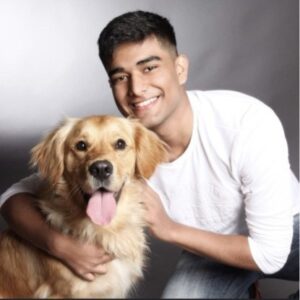 For his part, Akshat is currently building a company called Orbit. The sad truth about the current digital age is that “we have never been historically unhappier,” he said. “Orbit will empower people by making mental health as transparent and actionable as physical health through a non-invasive brain wearable. Orbit is unlocking cognition by building the first foundation model of the brain!”
For his part, Akshat is currently building a company called Orbit. The sad truth about the current digital age is that “we have never been historically unhappier,” he said. “Orbit will empower people by making mental health as transparent and actionable as physical health through a non-invasive brain wearable. Orbit is unlocking cognition by building the first foundation model of the brain!”
In addition to his work with Entrepreneur First, Akshat is part of the first cohort of Founders – the University of Cambridge’s own accelerator programme. He graduated from Cambridge in Biomedical Engineering last year, launching Orbit at the start of 2024.
“At the Neuro Optics Lab [in Cambridge], I developed the first, and only, brain computer interface using HD DOT, a novel imaging approach to track human brain function at comparable resolutions to an fMRI. This modality, being cheap, portable and high resolution, is uniquely positioned to create the foundation model of our brains!”
Akshat has won multiple awards at international conferences and is writing a first-author paper on the subject.
By leveraging the novel wearable technology, Orbit is focussing on making brain-tracking as simple and accessible as Fitbit made fitness-tracking – “all in the comfort of your favourite baseball cap or beanie!” as he put it.
“With each version, Orbit builds the largest, real-world brain data-sets to unlock new secrets about the way we perceive the world around us – our cognition. It starts by understanding mental workload and aims to progress to complex mental states, including anxiety, stress and depression. Each version helps us regain control of a new emotion, at each step regaining happiness through giving us a deeper understanding and control of our brain.”
 Finally, Pavir Patel’s business is Outerop. Like Akshat’s start-up, it launched at the beginning of this year. Outerop helps grow businesses online using AI, making it easier for them to build high-quality, reliable Large Language Model (LLM) products and to start creating self-optimising LLM pipelines (a series of steps where the output of one is the input of the other). Its slogan is: “Build GenAI products your customers love.”
Finally, Pavir Patel’s business is Outerop. Like Akshat’s start-up, it launched at the beginning of this year. Outerop helps grow businesses online using AI, making it easier for them to build high-quality, reliable Large Language Model (LLM) products and to start creating self-optimising LLM pipelines (a series of steps where the output of one is the input of the other). Its slogan is: “Build GenAI products your customers love.”
Since reading Economics at Nottingham, Pavir has, he said, “done all sorts – from incubating J P Morgan’s first AI startup doing NLP; setting up their FinTech team in Asia (Hong Kong was awesome!) and scaling Europe’s leading broker/crypto exchange, Bitpanda Pro, to spinning off a company with a Series A raise [a company’s first significant round of venture-capital financing] to launching an e-commerce business with my wife”.

 An A-level German student, Chanakya was nominated by the School for one of the prestigious scholarships offered by the Dresden Trust, a British charity that fosters relations with the eastern German city of Dresden. One of the greatest centres of European culture, Dresden, which is in Saxony, was destroyed by Allied bombing in February 1945.
An A-level German student, Chanakya was nominated by the School for one of the prestigious scholarships offered by the Dresden Trust, a British charity that fosters relations with the eastern German city of Dresden. One of the greatest centres of European culture, Dresden, which is in Saxony, was destroyed by Allied bombing in February 1945. “Each school year begins with a church service in the Kreuzkirche (Church of the Holy Cross) at which new students receive a model fish representing the school logo (the ichthys) to symbolise their acceptance into the school community. This year, the Year 6s were kind enough to make extra ‘Benno fish’ to be presented to the school’s exchange students. I certainly felt incredibly welcome being presented my fish at the end of a service that had otherwise been full of lovely German choral music,” he wrote.
“Each school year begins with a church service in the Kreuzkirche (Church of the Holy Cross) at which new students receive a model fish representing the school logo (the ichthys) to symbolise their acceptance into the school community. This year, the Year 6s were kind enough to make extra ‘Benno fish’ to be presented to the school’s exchange students. I certainly felt incredibly welcome being presented my fish at the end of a service that had otherwise been full of lovely German choral music,” he wrote. During his free hours, he enjoyed exploring the city, especially its “gorgeous baroque church – the ‘Frauenkirche’ (‘Church of Our Lady’)”. This was rebuilt following its destruction in World War II, with the support of benefactors including the Dresden Trust
During his free hours, he enjoyed exploring the city, especially its “gorgeous baroque church – the ‘Frauenkirche’ (‘Church of Our Lady’)”. This was rebuilt following its destruction in World War II, with the support of benefactors including the Dresden Trust
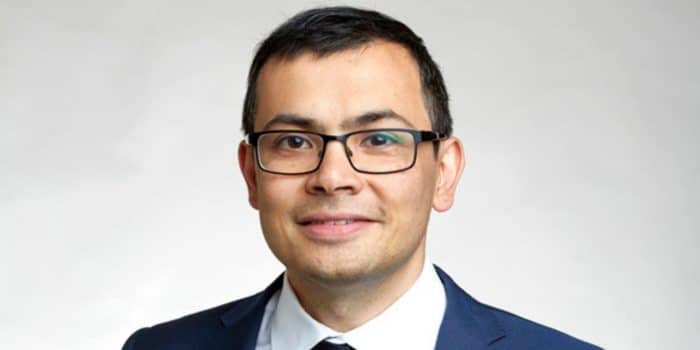
 “In 2020, Demis Hassabis and John Jumper presented an AI model called AlphaFold2. With its help, they have been able to predict the structure of virtually all the 200 million proteins that researchers have identified.”
“In 2020, Demis Hassabis and John Jumper presented an AI model called AlphaFold2. With its help, they have been able to predict the structure of virtually all the 200 million proteins that researchers have identified.”

 Their success in the continental round and, before that, at the national round, comes in the first year that QE boys have entered the competition.
Their success in the continental round and, before that, at the national round, comes in the first year that QE boys have entered the competition. For his part, Team 1 member Ishtarth Katageri relished the sheer challenge of this module: “Collaborating with my team mates when we had a day to respond was difficult, especially with some team members in different countries at the time.”
For his part, Team 1 member Ishtarth Katageri relished the sheer challenge of this module: “Collaborating with my team mates when we had a day to respond was difficult, especially with some team members in different countries at the time.”
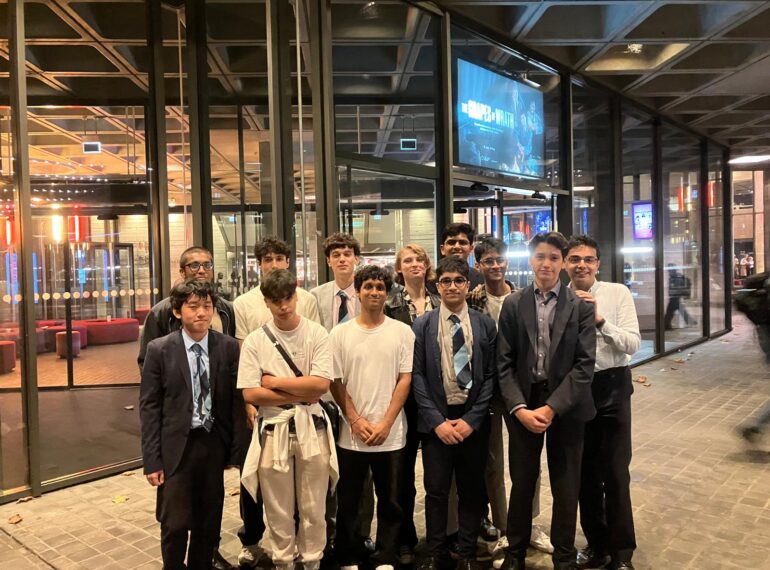

 Richard said he realised even before going to university where he needed to be to pursue his goal of founding and growing a startup. “I knew that if I wanted to do it, the only place I could was the US. The problem was that education in the US was so expensive – four years of a degree course can easily be $250,000.”
Richard said he realised even before going to university where he needed to be to pursue his goal of founding and growing a startup. “I knew that if I wanted to do it, the only place I could was the US. The problem was that education in the US was so expensive – four years of a degree course can easily be $250,000.” For his part, Akshat is currently building a company called
For his part, Akshat is currently building a company called  Finally, Pavir Patel’s business is
Finally, Pavir Patel’s business is 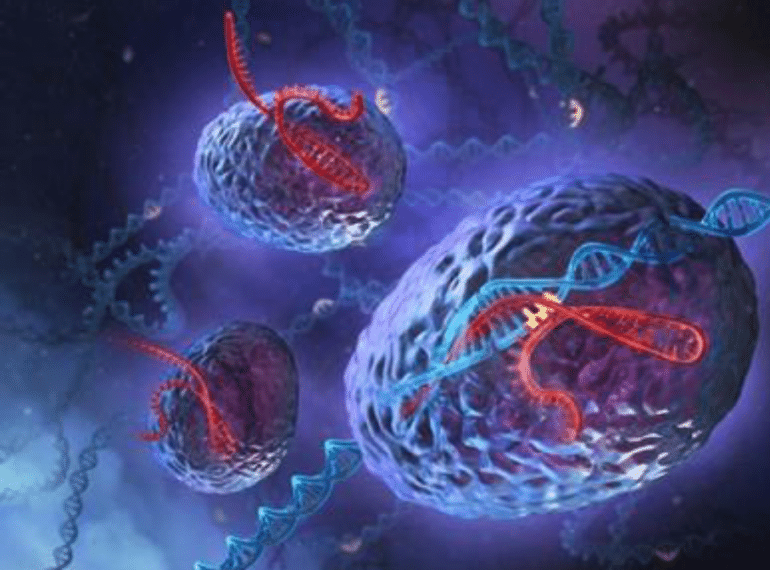
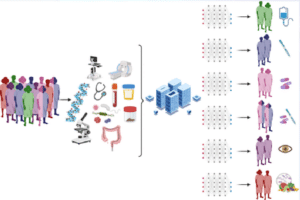 Featuring articles by six of QE’s senior biologists, Bioquest looks in detail at medical topics, from the effects of ingesting microplastics to HIV immunity, while also examining ethical issues.
Featuring articles by six of QE’s senior biologists, Bioquest looks in detail at medical topics, from the effects of ingesting microplastics to HIV immunity, while also examining ethical issues.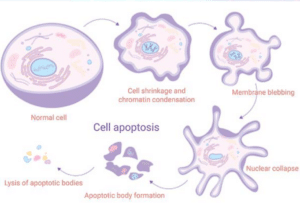 Dharm is in Year 12. All the other authors are in Year 13.
Dharm is in Year 12. All the other authors are in Year 13. The boys’ articles all include a bibliography, while several also feature a glossary and ‘synoptic links’ (showing how the material covered relates to the GCSE and A-level syllabuses).
The boys’ articles all include a bibliography, while several also feature a glossary and ‘synoptic links’ (showing how the material covered relates to the GCSE and A-level syllabuses).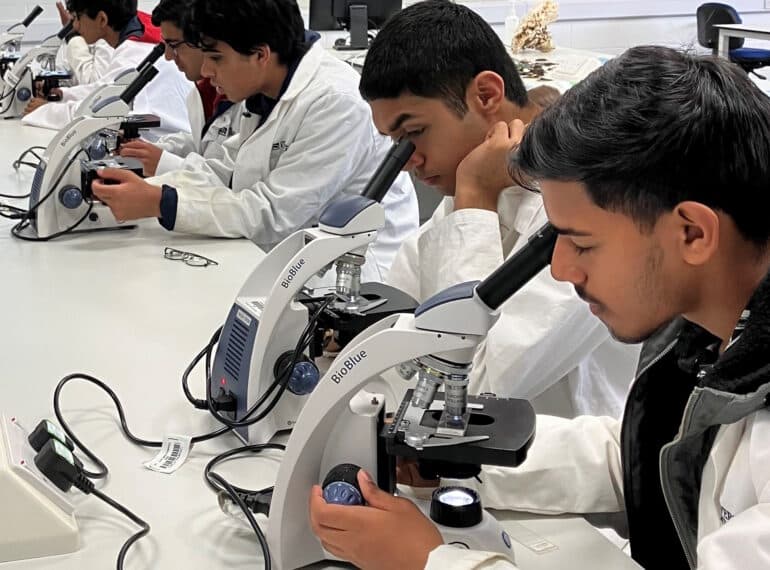
 The result was a summer trip by 25 senior pupils, who learned about the ground-breaking research at the University of Derby laboratory that aims to save the world’s coral reefs from extinction.
The result was a summer trip by 25 senior pupils, who learned about the ground-breaking research at the University of Derby laboratory that aims to save the world’s coral reefs from extinction. “The scientists at the Coral Spawning Laboratory are engaged in ground-breaking research with the aim of saving reefs from extinction, specifically in relation to the threats of ocean acidification and warming caused by human-induced changes to the carbon cycle and global warming.
“The scientists at the Coral Spawning Laboratory are engaged in ground-breaking research with the aim of saving reefs from extinction, specifically in relation to the threats of ocean acidification and warming caused by human-induced changes to the carbon cycle and global warming. The 25 participating students were drawn mainly from the current Year 13, but also from Years 11 and 12. They were accompanied by Mrs Macdonald, a Geography teacher in addition to her role as Deputy Head (Academic), and by Gillian Ridge, who is Head of Biology.
The 25 participating students were drawn mainly from the current Year 13, but also from Years 11 and 12. They were accompanied by Mrs Macdonald, a Geography teacher in addition to her role as Deputy Head (Academic), and by Gillian Ridge, who is Head of Biology. The boys enjoyed a tour of the laboratory, during which they had the opportunity to see the coral-spawning tanks and the new seagrass facility, where scientists recently succeeded in getting seagrass to flower and seed in laboratory conditions.
The boys enjoyed a tour of the laboratory, during which they had the opportunity to see the coral-spawning tanks and the new seagrass facility, where scientists recently succeeded in getting seagrass to flower and seed in laboratory conditions.
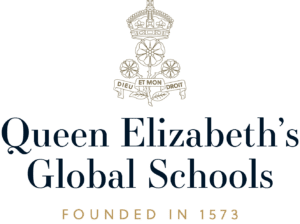 The revenue received from this enterprise over time will be invested into significant capital expenditure projects, including new and improved facilities at the QE Barnet campus.
The revenue received from this enterprise over time will be invested into significant capital expenditure projects, including new and improved facilities at the QE Barnet campus.